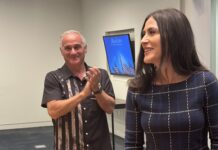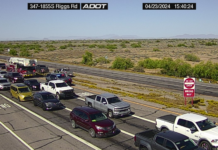
Players in a high-profile case against the City of Maricopa presented arguments Monday in a Pinal County courtroom, during which it was alleged by the defense that the plaintiff was paid to file the complaint.
The suit, filed by attorneys Grant Woods and Michael Riikola on behalf of Rancho El Dorado resident Bonita Burks, argues the city improperly granted a conditional use permit to Private Motorsports Group, a company wanting to build a private racetrack on the outskirts of the city under the name Apex Motor Club.
During the hearing Evan Bolick, counsel for the defense, alleged Burks was “being paid” by an unnamed entity to be the plaintiff in this case.
Burks is the owner of Sign Here Petitions, a signature-gathering company Bolick said was enlisted by another organization – Maricopa Citizens Protecting Tax Payers – to gather signatures for a petition seeking a referendum on the same permit. Bolick provided no proof of his allegation.
Presiding Judge Robert Olson struck the comments from the official record based on what Woods argued was “defamation, per se.”
Burks’ suit is the second filed against the city over the Apex permit. Maricopa Citizens Protecting Taxpayers was first to sue the city and Private Motorsports Group, regarding the permit, after city officials declined to forward their petition for referendum to the Pinal County Recorder’s Office.
In August, a Pinal County judge ruled in favor of the organization, forcing the city to forward the signatures. The city, while simultaneously filing to initiate the referendum, also filed an appeal. And, on Sept. 6, an Arizona appellate court overturned the Pinal County ruling.
The Court of Appeals has yet to release its full formal opinion on the appeal.
Maricopa Citizens Protecting Taxpayers fired back by filing motions with the Arizona Supreme Court. A ruling is expected in that case before Sept. 14, the final day the referendum can be canceled.
Burks’ suit specifically alleges the city improperly interpreted zoning codes in granting the permit to the track, which her suit alleges will “result in, among other things, significantly increased noise, odors, dust, gas and smoke emanating from the property, all of which uniquely and negatively affect Plaintiff’s [Burks] use and enjoyment of her property.”
To the idea of the track “uniquely” affecting her, the defense argued there needed to be evidence of “special damages or peculiar harm” done against Burks specifically. If they did indeed exist, these types of effects – noise, odors, gas, smoke – they argued, are “generalized,” affecting the entire community and not just her.
Burks lives more than five miles from the proposed private track.
The defense further argued these “general damages” were already assessed by the city during the permit application process with sound, traffic and engineering studies that claim the effects would be negligible.
The suit further argues the city had no right to sign an emergency ordinance that pushed the issue to the soonest possible election, hence the accelerated timeline with appeals.
“Let’s just call it what it is, it’s not an emergency,” Woods argued, saying they simply didn’t want to stifle development.
The defense argued in response that the city, according to legal precedent, had every right to create an emergency ordinance.
Olson anticipates filing his decision by Sept. 13, one day before the Arizona Supreme Court is expected to hand down its ruling on the first case. It is also one day before the city will have its last chance to cancel the referendum.

![MHS G.O.A.T. a ‘rookie sleeper’ in NFL draft Arizona Wildcats wide receiver Jacob Cowing speaks to the press after a practice Aug. 11, 2023. [Bryan Mordt]](https://www.inmaricopa.com/wp-content/uploads/2024/04/cowing-overlay-3-218x150.png)




![Maricopa’s ‘TikTok Rizz Party,’ explained One of several flyers for a "TikTok rizz party" is taped to a door in the Maricopa Business Center along Honeycutt Road on April 23, 2024. [Monica D. Spencer]](https://www.inmaricopa.com/wp-content/uploads/2024/04/spencer-042324-tiktok-rizz-party-flyer-web-218x150.jpg)





![Alleged car thief released without charges Phoenix police stop a stolen vehicle on April 20, 2024. [Facebook]](https://www.inmaricopa.com/wp-content/uploads/2024/04/IMG_5040-218x150.jpg)

![MHS G.O.A.T. a ‘rookie sleeper’ in NFL draft Arizona Wildcats wide receiver Jacob Cowing speaks to the press after a practice Aug. 11, 2023. [Bryan Mordt]](https://www.inmaricopa.com/wp-content/uploads/2024/04/cowing-overlay-3-100x70.png)


